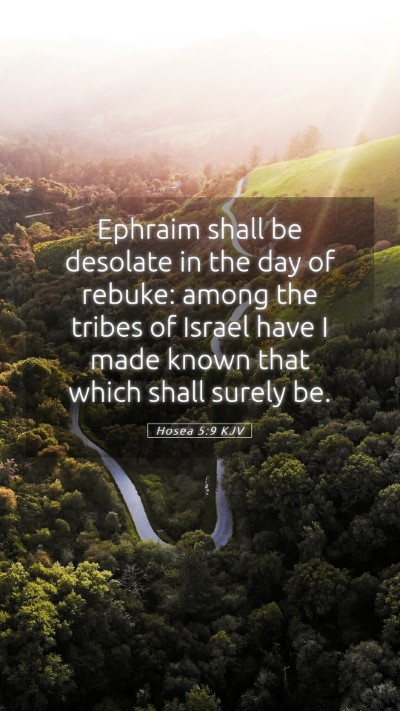Old Testament
Genesis Exodus Leviticus Numbers Deuteronomy Joshua Judges Ruth 1 Samuel 2 Samuel 1 Kings 2 Kings 1 Chronicles 2 Chronicles Ezra Nehemiah Esther Job Psalms Proverbs Ecclesiastes Song of Solomon Isaiah Jeremiah Lamentations Ezekiel Daniel Hosea Joel Amos Obadiah Jonah Micah Nahum Habakkuk Zephaniah Haggai Zechariah MalachiHosea 5:9 Meaning
What is the meaning of Hosea 5:9?
Ephraim shall be desolate in the day of rebuke: among the tribes of Israel have I made known that which shall surely be.
Hosea 5:9 Bible Verse Meaning
Understanding Hosea 5:9
Hosea 5:9 states: "Ephraim shall be desolate in the day of rebuke: among the tribes of Israel have I made known that which shall surely be." This verse serves as a significant verse in the context of the prophetic messages delivered by the prophet Hosea, highlighting profound themes of judgment, desolation, and the consequences of sin.
Bible Verse Meaning
The meaning of Bible verses can often be deep and multifaceted. In Hosea 5:9, the prophet speaks concerning the northern kingdom of Israel, represented by Ephraim. This reflects the larger theme of divine judgment against Israel for their idolatry and unfaithfulness to God.
Bible Verse Interpretations
Commentaries offer various insights into this verse:
- Matthew Henry: Highlights that this verse represents God's declaration that Ephraim (Israel) will experience desolation as a direct consequence of their rebellion against Him. Henry emphasizes God's justice and the certainty of divine retribution.
- Albert Barnes: Sees this verse as a foreshadowing of the impending destruction of Israel, affirming that when God eventually rebukes, there will be no escape for those who turn away from Him. Barnes contextualizes this desolation within the broader narrative of Israel's sins.
- Adam Clarke: Discusses the signification of desolation, suggesting that it is a prophetic declaration of Israel’s imminent downfall due to unrepentant sin. Clarke elucidates the notion that God makes His judgments known publicly, affirming His sovereignty and foreknowledge.
Bible Verse Understanding
In understanding Scripture, one must grapple with the socio-historical context of the passage. The southern kingdom of Judah often represented righteousness compared to the northern kingdom of Ephraim, which was notorious for idol worship and turning away from God's commandments. This verse serves as a critical warning about the dire consequences of forsaking divine statutes.
Bible Verse Explanations
To deepen your Bible study insights, consider the thematic elements within Hosea 5:9:
- Desolation: The term signifies not just physical destruction but a spiritual void wherein God’s presence is absent due to the people's sins.
- Day of Rebuke: This phrase emphasizes a specific time of divine judgment, indicating that God has observed their transgressions and will act accordingly.
- Assurance of Prophecy: The certainty with which Hosea speaks reflects God's unchanging nature and His promises, encouraging believers to heed His warnings.
Bible Verse Commentary
A comprehensive commentary on this verse reveals not only the nature of God's wrath but also reflects His desire for repentance and relationship with His people. The prophetic nature of Hosea’s message is not simply one of condemnation but also of warning and an invitation to return to God.
Cross References
This verse is related to several other passages that amplify its message:
- Amos 3:2 - Highlights God's unique relationship with Israel and the accountability that comes with it.
- Micah 1:6 - Discusses the destruction foretold for Samaria, reminiscent of Hosea's prophecies.
- Isaiah 5:5 - Another declaration of impending judgment reflecting Israel’s failures.
Applying the Verse to Daily Life
When considering how to interpret Bible verses like Hosea 5:9, it’s crucial to reflect on the applications for our own lives. Understanding difficult Bible passages can lead us to better recognize the importance of faithfulness and obedience to God. In a modern context, the call to repentance and the consequences of straying from faith remain vital.
Conclusion
In summary, Hosea 5:9 presents a vivid picture of God's displeasure with those who turn away from Him, reminding us of the importance of remaining steadfast in our faith. Its exploration through various commentaries enhances our understanding, equipping Bible study groups with a richer foundation for discussion. The verse encapsulates the gravity of divine judgment and the urgency for repentance, urging believers to stay aligned with God's will.


